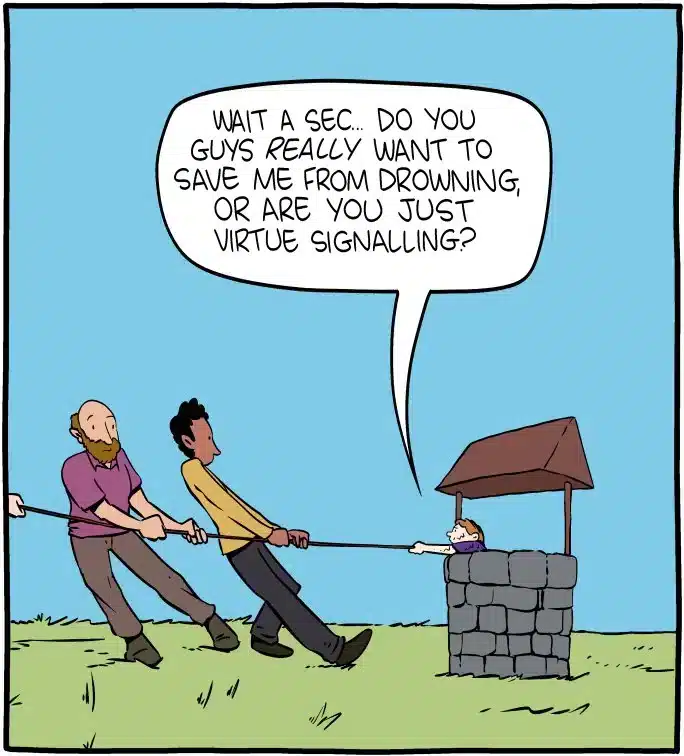I support virtue signaling.
Virtue signaling happens when an individual, through action or practice, publicly expresses opinions or sentiments intended to demonstrate their good character or the moral correctness of their position on a particular issue.
Examples of virtue signaling include:
- A person shares a status on social media in support of an environmental cause because they want to show others that they’re a good person.
- A person wears a shirt showing that they donated money to some cause because they want others to think that they’re charitable.
- A company announces that they’ll change their terms of service because they want to improve their public image.
An excellent, real-life example of virtue signaling was the 2014 ice bucket challenge, wherein people dumped ice water over their heads, posted footage of the event on social media, and claimed to have made a donation to the ALS Association.
Many complained at the time that this was an obvious case of virtue signaling. People around the world wanted to signal to their friends, family, and community that they were charitable enough to do something difficult in the name of medical research.
Also, many made no donations to the charity. They merely posted their recording in order to garner attention and make people think that they were doing a good deed.
But here’s the thing:
Even if they didn’t donate a penny to the ALS Association, their action demonstrated support for the organization and encouraged others to do the same. Their actions and deceitful claims about making a donation spurred others to dump ice water of their heads and actually make a donation, leading to the largest fundraising event in the history of the ALS Association, raising more than $220 million worldwide.
Even if you’re doing something virtuous simply to signal your goodness to others, you’re still doing something virtuous.
For example, even if you’re campaigning relentlessly for climate action but still flying in a private jet more than anyone else in the world (Taylor Swift), you’re still campaigning for climate action. You’re still raising awareness, promoting an important cause, and perhaps encouraging others to make a change in their lifestyle.
Yes, it would be enormously beneficial to the environment if Taylor Swift and her wealthy friends would fly in their private jets less often, but her virtue signaling is still undoubtedly making a difference. She’s still doing something virtuous, even if her actions may constitute virtue signaling.
This is the great thing about virtue signaling:
Even if you’re virtue signaling, you’re almost always still doing something virtuous. It may simply be raising awareness for an issue or expressing support for a cause, but these are still good things. Not as virtuous as you might be portraying, but virtuous nonetheless.
People who point fingers and criticize others over their possible virtue signaling are soulless monsters. These are the people who are cognitively incapable of accepting the reality that human beings are complicated:
We can say one thing (and really believe it) while doing entirely the opposite.
We enjoy public affirmation for beliefs that we may not possess to the degree we express.
We may take positive action with the sole purpose of burnishing our image or impressing others.
None of these are ideal acts of virtue, but virtuous action is still taking place.
If you make a large donation to reduce your tax liability, you still make a large donation.
If you make a donation large enough to add a wing to the hospital with the sole purpose of having your name on the building, the new hospital wing still exists.
If you purchase a tee shirt expressing your support for Black Lives Matter while doing nothing else to improve the lives of your black neighbors, you’re still demonstrating support for the cause. And the money from the purchase of the tee shirt probably supported that cause in some small way.
If you hang a Ukrainian flag from your window while doing nothing to support the Ukrainian people in their war against Russa, you’re still expressing support. Spreading the message. Perhaps encouraging someone else to educate themself about the crisis, make a donation, or call their Congressperson.
It would be great if every virtuous act came from a place of selflessness. It would be great if every act of virtue was as generous as it might seem. But as long as you’re not causing harm while claiming to be helping, I support virtue signaling.
More importantly, I despise the sanctimonious pests who take great pleasure in calling out virtue signaling whenever possible.
Shut up and go do something virtuous.



